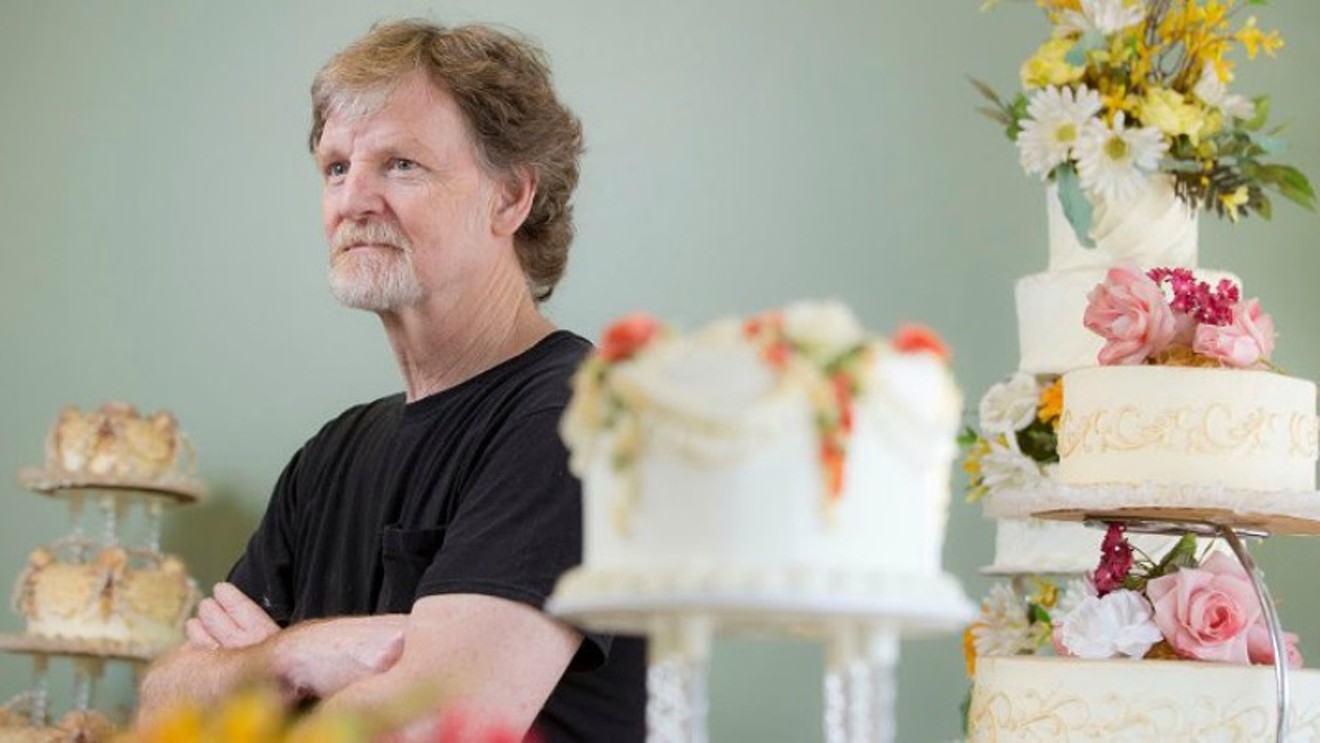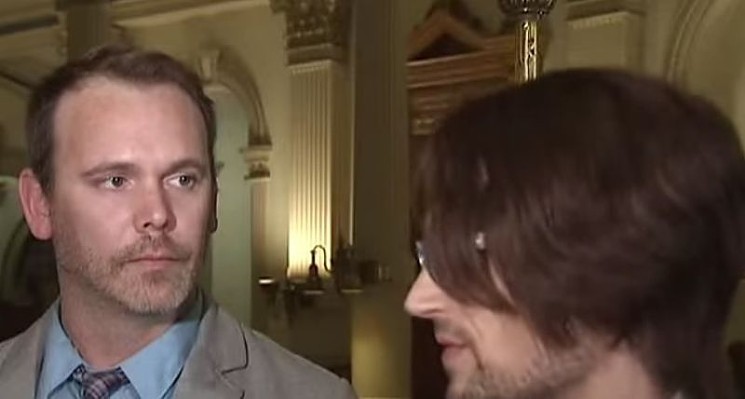Alliance Defending Freedom, the conservative Christian organization that backed Phillips, is celebrating the development.
"Jack serves all customers; he simply declines to express messages or celebrate events that violate his deeply held beliefs," asserts ADF senior counsel Kristen Waggoner in a statement. "Creative professionals who serve all people should be free to create art consistent with their convictions without the threat of government punishment. Government hostility toward people of faith has no place in our society, yet the state of Colorado was openly antagonistic toward Jack’s religious beliefs about marriage. The court was right to condemn that. Tolerance and respect for good-faith differences of opinion are essential in a society like ours. This decision makes clear that the government must respect Jack’s beliefs about marriage."
The author of the majority opinion, released June 4, was Justice Anthony Kennedy, long considered to be the swing vote on the current court. He was joined by Chief Justice John Roberts, as well as recently named Colorado justice Neil Gorsuch (who filed a concurring opinion), Samuel Alito, Stephen Breyer and, surprisingly, Elena Kagen, an appointee of President Barack Obama. Dissenting were Justice Ruth Bader Ginsberg, joined by colleague Sonia Sotomayor.
The complete ruling is accessible below, but in the introduction to his opinion, Justice Kennedy essentially casts blame on the Colorado Civil Rights Commission, which found that Craig and Mullins had been victims of discrimination, as opposed to declaring that Phillips's work could be considered speech under the First Amendment because of its artistic qualities.
Kennedy notes that "the freedoms asserted here are both the freedom of speech and the free exercise of religion. The free speech aspect of this case is difficult, for few persons who have seen a beautiful wedding cake might have thought of its creation as an exercise of protected speech. This is an instructive example, however, of the proposition that the application of constitutional freedoms in new contexts can deepen our understanding of their meaning. One of the difficulties in this case is that the parties disagree as to the extent of the baker’s refusal to provide service. If a baker refused to design a special cake with words or images celebrating the marriage — for instance, a cake showing words with religious meaning — that might be different from a refusal to sell any cake at all. In defining whether a baker’s creation can be protected, these details might make a difference."
To Kennedy, "the same difficulties arise in determining whether a baker has a valid free exercise claim. A baker’s refusal to attend the wedding to ensure that the cake is cut the right way, or a refusal to put certain religious words or decorations on the cake, or even a refusal to sell a cake that has been baked for the public generally but includes certain religious words or symbols on it are just three examples of possibilities that seem all but endless. Whatever the confluence of speech and free exercise principles might be in some cases, the Colorado Civil Rights Commission’s consideration of this case was inconsistent with the State’s obligation of religious neutrality."
Kennedy elaborates: "The reason and motive for the baker’s refusal were based on his sincere religious beliefs and convictions. The Court’s precedents make clear that the baker, in his capacity as the owner of a business serving the public, might have his right to the free exercise of religion limited by generally applicable laws. Still, the delicate question of when the free exercise of his religion must yield to an otherwise valid exercise of state power needed to be determined in an adjudication in which religious hostility on the part of the State itself would not be a factor in the balance the State sought to reach. That requirement, however, was not met here. When the Colorado Civil Rights Commission considered this case, it did not do so with the religious neutrality that the Constitution requires. Given all these considerations, it is proper to hold that whatever the outcome of some future controversy involving facts similar to these, the Commission’s actions here violated the Free Exercise Clause; and its order must be set aside."

In 2015, Lonnie Hanzon created an equality cake for PrideFest to protest against Jack Phillips's actions.
Photo courtesy of Lonnie Hanzon
"There is much in the Court’s opinion with which I agree," Ginsberg acknowledges. Among them: "[I]t is a general rule that [religious and philosophical] objections do not allow business owners and other actors in the economy and in society to deny protected persons equal access to goods and services under a neutral and generally applicable public accommodations law," "Colorado law can protect gay persons, just as it can protect other classes of individuals, in acquiring whatever products and services they choose on the same terms and conditions as are offered to other members of the public," and "[P]urveyors of goods and services who object
to gay marriages for moral and religious reasons [may not] put up signs saying ‘no goods or services will be sold if they will be used for gay marriages'" in order to ensure that "persons may be spared from 'indignities when they seek goods and services in an open market.'"
Still, Ginsberg says she "strongly" disagrees "with the Court's conclusion that Craig and Mullins should lose this case. All of the above-quoted statements point in the opposite direction. The Court concludes that 'Phillips’s religious objection was not considered with the neutrality that the Free Exercise Clause requires.'"
This opinion, Ginsberg continues, "rests on evidence said to show the Colorado Civil Rights Commission’s (Commission) hostility to religion. Hostility is discernible, the Court maintains, from the asserted 'disparate consideration of Phillips’ case compared to the cases of three other bakers who refused to make cakes
requested by William Jack....' The Court also finds hostility in statements made at two public hearings on Phillips’ appeal to the Commission."
However, "the different outcomes the Court features do not evidence hostility to religion of the kind we have
previously held to signal a free-exercise violation," Ginsberg asserts, "nor do the comments by one or two members of one of the four decision-making entities considering this case justify reversing the judgment below."
Click to read the U.S. Supreme Court's decision in Masterpiece Cakeshop v. Colorado Civil Rights Commission.













